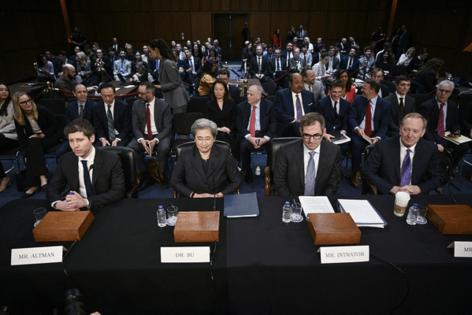Microsoft's Brad Smith, other tech execs give Congress AI wish list
Published in Business News
Tech leaders representing four major players in artificial intelligence appeared before Congress on Thursday, urging looser regulation and heavier investment in energy to support the technology's growth.
Members of the Senate Committee on Commerce, Science and Transportation probed Microsoft President Brad Smith, OpenAI CEO Sam Altman and others on ethical and energy concerns with widespread AI adoption. But the theme running through most of the hearing was whether the U.S. was winning the AI race, especially against China.
"It is very hard to say how far ahead we are," Altman said.
Smith said in his testimony that to win the race, the federal government needs to support the private sector at every level. That means improving and building out the infrastructure needed to scale up AI, namely massive data centers and a modernized electrical grid.
"The country must recruit and train skilled labor like electricians and pipe fitters that are in short supply," Smith said. "We all must summon the best of our researchers at national labs and universities, supported by federal basic research programs and partnerships that have become the envy of the world."
During the hearing, Smith said some of the tightest regulations for building out an AI infrastructure come from the federal level. One example is permitting for data centers.
"The number one challenge in the United States when it comes to permitting is not local, it's not state, it is the federal wetlands permit administered by the Army Corps of Engineers," he said. "We can typically get our state and local permits done in six to nine months; the federal wetlands permit is taking often 18 to 24 months."
If the Trump administration focused on that, Smith said, data center construction could accelerate.
Microsoft, like other companies, has committed billions this year to build out its AI infrastructure. As of January, Microsoft was on track to pump $80 billion into AI-enabled data centers and other AI investments during its 2025 fiscal year, which ends on June 30.
Outside of regulation, AI leaders don't want to be caught up in escalating trade wars. If the U.S. wants to be a global leader in AI, as Smith put it, then it has to be able to send its technology across the globe.
"At the end of the day, the world wants to be able to build and deploy artificial intelligence in a very broad way," said Michael Intrator, CEO of CoreWeave, a cloud computing startup focused on high-performance systems. "If we do not step into that role, other technology will step in that role."
Lisa Su, CEO of California-based hardware giant Advanced Micro Devices, said there's a "clear recognition" that the U.S. needs an export strategy for AI to make sure allies get chips and other technology without it being diverted to competing countries like China.
Where the four tech leaders broke ranks is on the issue of standards in AI. Sen. Maria Cantwell, the Washington Democrat serving as ranking member of the committee, asked the quartet whether the U.S. needed the National Institute of Standards and Technology to support developing standards in AI.
Su, Intrator and Smith all said yes.
"I don't think we need it," Altman said. "It can be helpful."
When asked to support their answers, Smith said AI will need industry standards.
"We will need American adoption of standards," he said. "We will need U.S. efforts to really ensure that the world buys into these standards."
©2025 The Seattle Times. Visit seattletimes.com. Distributed by Tribune Content Agency, LLC.












Comments